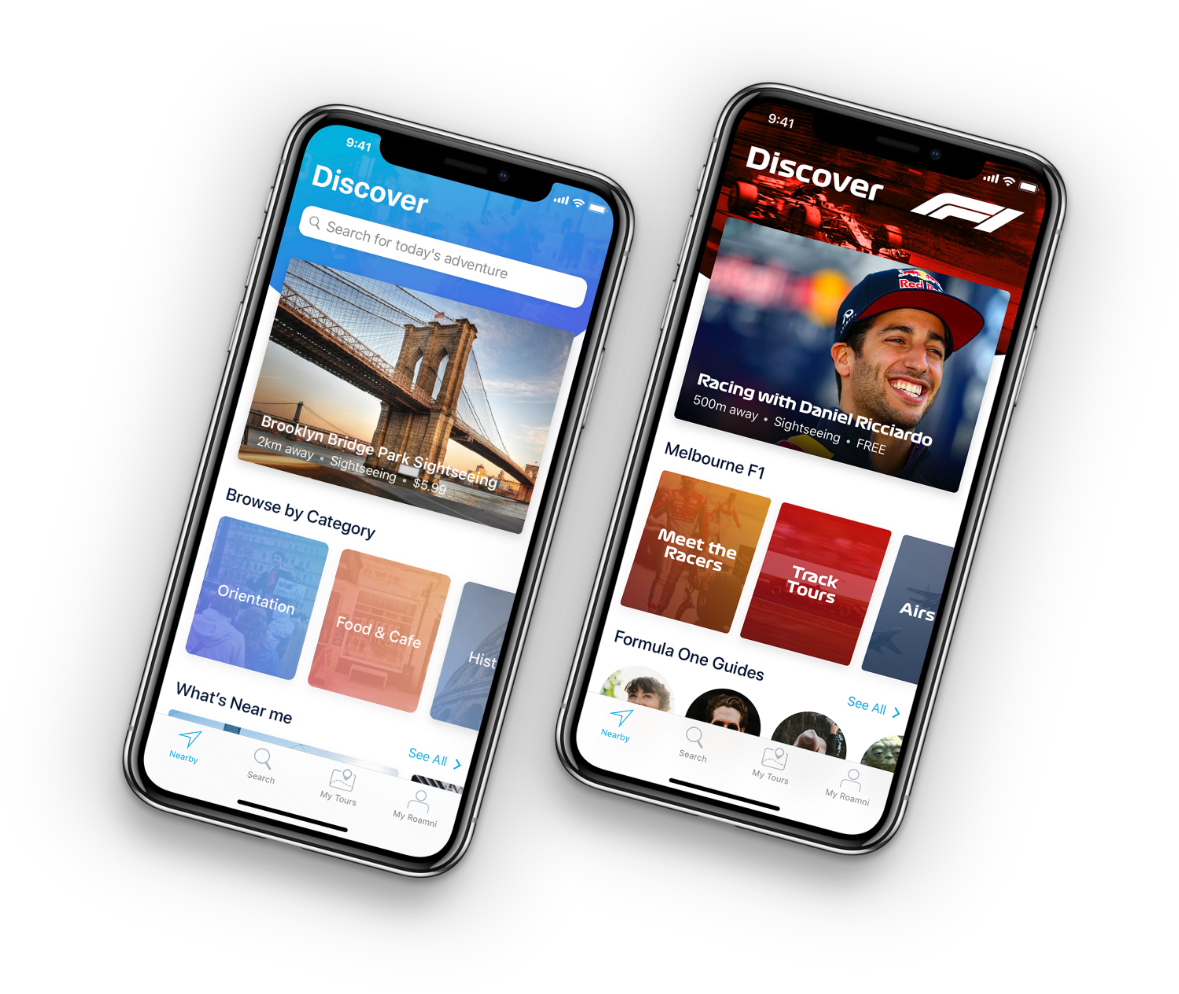8 Web Developer Soft Skills for Efficient Collaboration

Aptitude can get the task done. But attitude takes collaboration to the next level in web development projects.
That’s where soft skills come in.
In contrast to technical or hard skills that highlight subject matter expertise, soft skills are personal and interpersonal qualities that affect how web developers interact, communicate, and collaborate with others.
Here is some insightful data we found on LinkedIn: Adaptability, communication, and critical thinking are the top three in-demand soft skills for 2023. Additionally, according to a study, soft skills training boosts productivity and retention among employees by 12% and delivers a whopping 250% return on investment.
In our quest to become a brand known for speed, value, and quality, finding the best web developers with soft skills is critical — not just for our success but ultimately for our client’s success.
If you decide to outsource app development to us or set up your own web dev dream team, we created a roundup of our eight favorite web developer soft skills to help you choose the best talents to build your web app or website.
1. Time management
Deadline is like the antagonist in the story for anyone working under pressure. But it’s also a compass for those who need to show results.
That’s why good time management among web developers is a must-have skill in a world inundated with distractions, whether coming from push notifications of a mobile app or a neighbor’s dog that keeps on barking across the hall.
Unmet deadlines can cause delays, which, aside from disappointing the client, result in missed opportunities. Depending on the scale at which your company operates — the cost of delay can cost hundreds to millions of dollars.
But this can also positively work in reverse, a software development project launched in a short time frame can supercharge a brand’s exposure.
DIMERS’ success is an excellent example and a product of a web development team with stellar time management skills.

Source: Dimers
During the pandemic, DIMERS.com was built and launched to create a global impact. Our team employed a data-led design and development approach to ensure a clear direction and faster development times.
Within just three months, Dimers.com was launched and achieved over 1 million page views and 140 thousand users in 30 days, establishing itself as a prominent name brand in the North American Market.
Now, that’s the power of having expert web developers with amazing time management skills on board.
But there’s another soft skill that’s integral to the overall success of a project. So, carry on.
2. Communication
Communication is one of the key driving forces of a seamless collaboration among team members. When done effectively, it dispels misunderstandings, delays, conflicts, and wasted efforts.
Generally, web developers work with product managers, project managers, designers, and quality assurance teams, to name a few. Those gifted with communication skills can concisely and professionally verbalize pain points, blockers, and progress.
They also understand the power of active listening by engaging in the conversation and showing interest in what other team members say, including feedback.
This soft skill is useful when conducting meetings, whether internally with team members or with clients. According to a GitHub survey, aside from writing code and finding and fixing vulnerabilities, development teams spend their time on regular asynchronous team communication throughout the day.
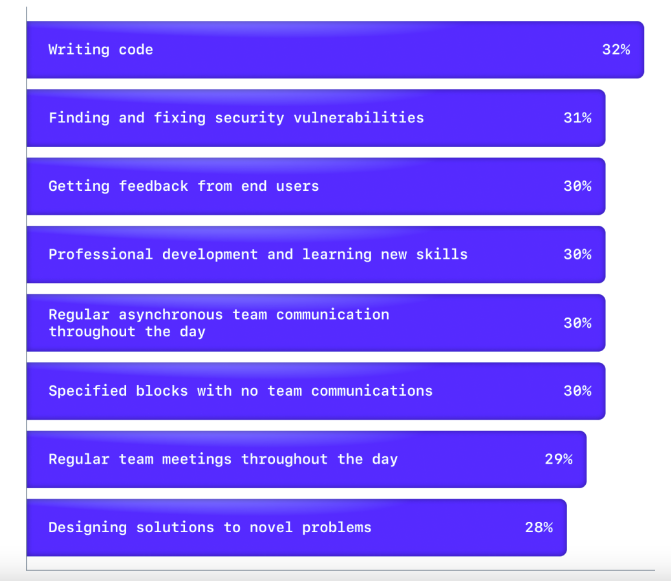
Source: GitHub
This shows that while technical skills are necessary, a soft skill like communication is the glue that holds everything together in a project — it acts as the adhesive that connects and aligns all the technical aspects, enabling smooth collaboration and successful execution.
3. Collaboration and teamwork
Collaboration allows the pooling of ideas, skills, and resources to create a functional website. Web developers who possess this soft skill are gatekeepers of a healthy workflow.
It’s because they understand that behind the knowledge and opinions that are shared freely, unique strengths and perspectives are brought to the table.
The end result is that it fosters creativity and innovation, which are crucial components of high-priority projects.
When collaboration exists, clients put their confidence and trust in the team because their ideas are acknowledged, and they feel the support they need when everybody is working together.
MUCUDU can attest to this as one of Appetiser’s app development partners. Collaboration is a common thread throughout the journey.
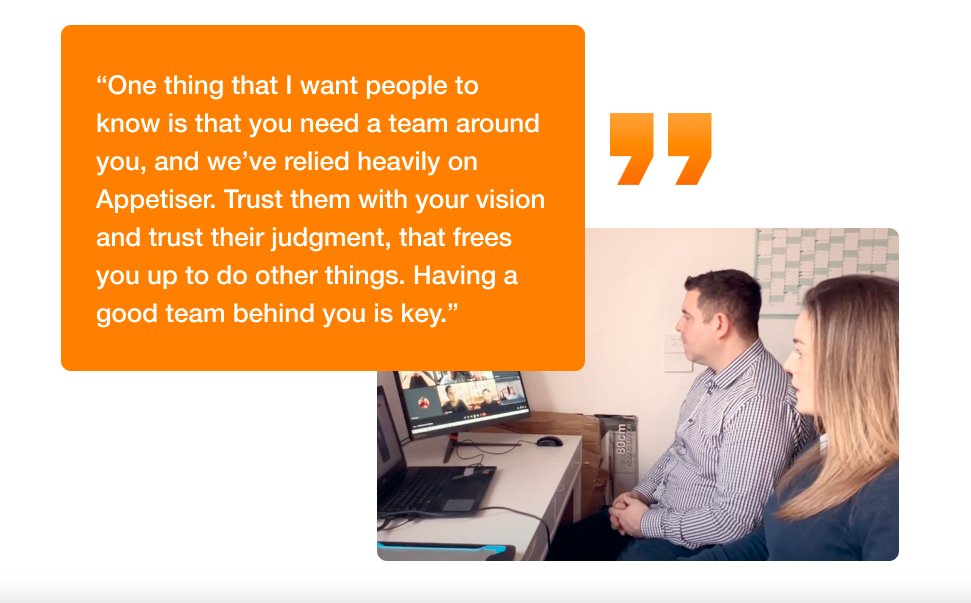
The founders of this project lacked technical expertise but soon realized that expert help was necessary to make it successful. At this crucial stage of a startup’s lifecycle, having a strong connection and shared vision can be the deciding factor between a beloved product and an ignored one.
The founders’ dedication and passion laid a solid foundation for MUCUDU to build upon. For first-time founders, a supportive and experienced development team is even more critical.
After all, collaboration is like a well-coordinated orchestra, where each member plays a different instrument but works together harmoniously to create a symphony of code.
Just as the conductor guides and directs the musicians, effective collaboration among web developers ensures seamless integration of diverse skills and produces exceptional digital experiences that resonate with users.
4. Problem-solving skills
Problem-solving skills enable web developers to analyze complex issues, generate innovative solutions, make informed decisions in the software development process, and troubleshoot challenges in their day-to-day work.
Research suggests that around 36% of workplaces require complex problem-solving skills as a core competency.
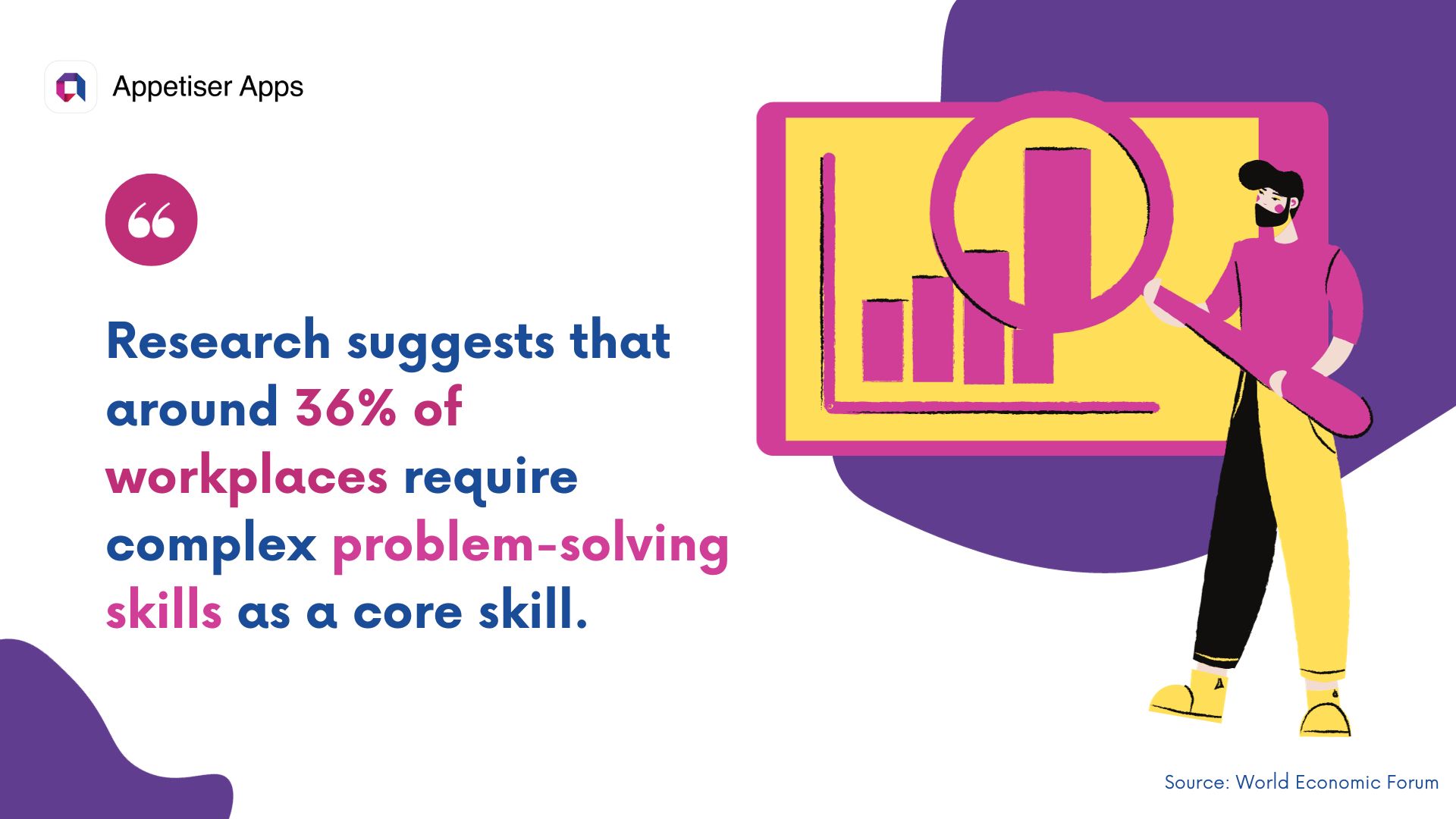
🎙 I have interviewed one of our core web developers, and he said he finds this soft skill useful in his work at Appetiser. It helps him create solutions as he explores ways to integrate apps and platforms that will supercharge our website performance and overall functionality.
If there’s a chance to start all over again in his career or the world experiences a reset – (the New World Order has come – this is just my fictional story as an example), he would still choose to have such soft skills.
Quoting him, “Even if everything disappears, problems will still exist. Problem-solving skill is a very needed skill.”
I couldn’t agree more.
In reality, web developers are always faced with challenges, and having problem-solving and critical thinking skills will help tackle complex ones like server migration and updates and the basics like optimizing the site’s speed.
Problem-solving skills come into play in the following ways. For instance, troubleshooting a slow website.
- ✅ Analyze the problem. They use some tools, like browser developer tools, network analyzers, and performance profiling tools. These tools help them find out why the website is slow.
- ✅ Come up with ideas to fix the problem. They think about how to make the images smaller, make the CSS and JavaScript files shorter, and use caching and content delivery networks.
- ✅ Consider pros and cons of each solution. They have to think about how hard and time-consuming it will be to do the solution, how it will affect the website, and how well it will work.
- ✅ Choose the best solution. They write clean code, change settings, and add new tools or plugins if needed.
- ✅ Test and fix any problems. The developer will check the solution if it makes the website faster, and they will make sure it doesn’t cause any new problems.
- ✅ Gather feedback. Listen to what users say, and they think about how to make the website even faster.
5. Adaptability and flexibility
These clustered soft skills are often used interchangeably, but they actually mean different things.
Let’s say a web developer is working on a project for a client, and they have already completed the initial app design and development phase. However, during the testing phase, the client provides feedback requesting major changes to the layout and functionality of the website. This is where adaptability and flexibility come into play.
An adaptable and flexible web developer would analyze the client’s constructive feedback, be open to making changes, and quickly adjust their approach to meet the new requirements. They might need to modify the code, rearrange elements, or explore different technologies or frameworks to achieve the desired outcome.
On another note, here’s a perfect illustration of adaptability across people, culture, and technology.
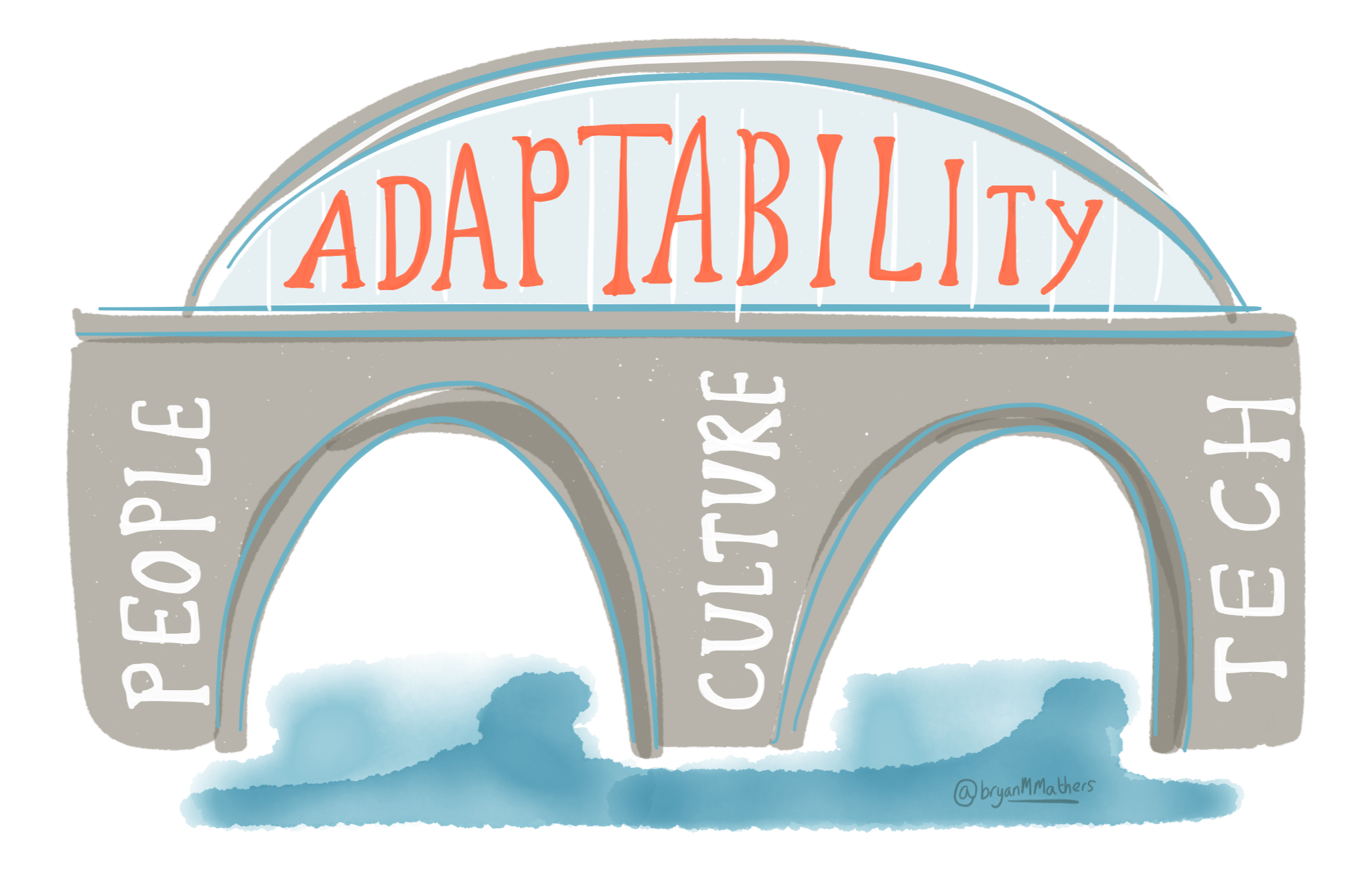
Source: Bryan Mathers
Adaptability is like an overarching object that sits atop a sturdy bridge, fortified by the foundations of people, culture, and technology.
Just as the bridge supports the weight of traffic and provides a path for progress, adaptability enables us to navigate the ever-changing currents of life.
6. Empathy
Empathy and emotional intelligence are vital soft skills for web developers to master. These skills are essential for fostering positive relationships with team members and clients.
Empathy is the ability to understand and share another person’s feelings. Developers with empathy comprehend their clients’ emotions and connect with them on a deeper level.

Here’s how it can be useful in the appropriate context.
- ✅ Working on collaborative projects. Empathy enables developers to gain a deeper understanding of their colleagues’ viewpoints, resulting in improved team communication and collaboration.
- ✅ Creating user-centered design. Developers who empathize with users can understand their needs, emotions, and motivations. This understanding leads to creating web apps and websites that are easier to use and more accessible, maximizing the chance that those digital assets bring in much-desired growth. To support this approach, AI Digital Asset Management helps teams organize, optimize, and deliver the right assets efficiently, ensuring consistent and user-friendly experiences across all digital touchpoints.
- ✅ Handling conflict resolution. Empathetic developers effectively navigate conflicts and disagreements within the team because they appreciate the viewpoints of others – leading to a harmonious and productive work environment.
The result? Lack of assertiveness and boundary-setting.
Web developers who are overly accommodating to users’ needs or colleagues’ requests can result in scope creep or missed deadlines. This can happen when developers prioritize pleasing others over maintaining project boundaries and adhering to timelines.
7. Attention to detail
Attention to detail is one of the most important skills for any web developer. Whether working alone or as part of a team, being thorough and meticulous can make a significant difference in the overall quality and success of the project.
Small errors can have a major impact on the functionality and user experience of the site.
A missing semicolon or misplaced tag can cause an entire page to break, leading to lost users and revenue.
A typo in a key piece of information can lead to confused users and a loss of trust in the site’s reliability.
These small errors may seem insignificant, but they can quickly add up and negatively affect the entire project.
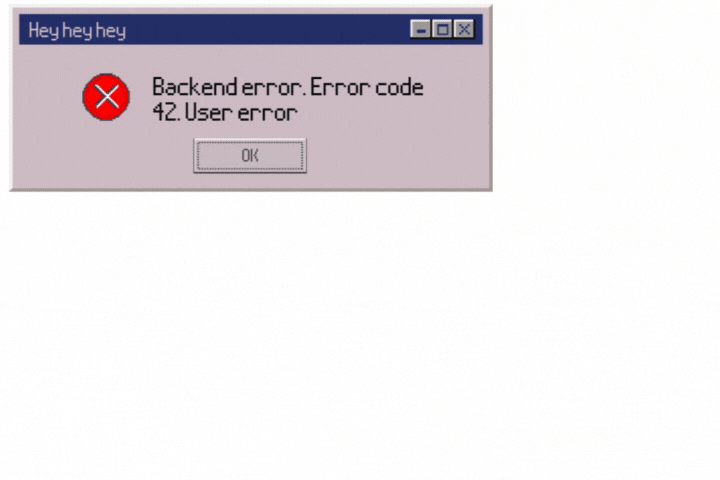
Of course, the last thing you want to see is that annoying error window above when working on the screen. It’s even worse when customers find errors on the website.
Therefore, to lessen errors and mistakes, another soft skill comes to the rescue.
8. Accountability
Without accountability, there is a high risk of projects going off track, deadlines being missed, and quality outputs being compromised.
Web developers who take ownership of their work and deliver on their commitments are far more likely to achieve the desired outcomes and exceed expectations.

During my interview with one of our core web developers, he specifically highlighted this soft skill that he has embodied at Appetiser.
📣 This soft skill was seen in action in an incident he was responsible for a few months ago. He announced his mistake in our Slack channel – #TIFU (Today, I f*cked up) – and shared his action plan to avoid such a situation from happening again.
One of the reasons why web developers love working at Appetiser is that the company encourages accountability among team members from the ground up – including our founders.
Our #TIFU channel is a prime example of accountability — when nurtured in the company — empowers people to strive for excellence in all aspects, whether it’s in app design, app development, sales and marketing, recruitment and acquisition, and more.
World-class web developers thrive in a healthy company culture
Web developers need more than just software development skills. Soft skills, such as communication, collaboration, adaptability, and empathy, are just as crucial for building a successful career in web development.
They are also sought after by companies that aim for exponential growth.
In my interview with one of our veteran web developers, I learned that skilled ones thrive in a healthy company culture that supports continuous learning. Fortunately, we have our Appetiser University for upskilling.
On average, the best websites are not built by solitary genius developers – web development is a collaborative work. In fact, it’s a team effort that comprises – designers, project managers, quality assurance, software engineers, and clients, to name a few.
While technical proficiency is an important factor, it’s not enough. World-class app developers must work in an environment that fosters creativity, innovation, and positive reinforcement.
They must feel empowered to take risks, challenge themselves, and learn from their mistakes.
This is why we at Appetiser believe in cultivating a culture of continuous improvement, each member living and breathing our core values: Be better tomorrow than today.
Clients like PointsBet and Dimers can bet on us – pun not intended – because our team of web developers has done it for them, generating million-dollar deals and huge exposure for their brands.
Do you need to launch a website soon?
Contact us today, we will help you find the best talent to build your website.
People Also Ask
To help you spot the developers who can truly drive your projects forward, I checked in with Vincent Niguida from our People & Culture team. He spends his days spotting the “intangibles” in candidates — the traits that quietly shape product quality, team flow, and timelines. Here’s what came up:
1. What makes a good web developer?
A good web developer brings more than technical expertise. Beyond strong problem-solving skills, they:
- Communicate clearly
- Collaborate with diverse teams
- Adapt to shifting priorities
- Stay open to feedback
These traits aren’t just nice-to-haves — they’re what keep projects moving and growing smoothly.
2. How does a developer’s emotional intelligence affect my app?
Tech projects are really people projects in disguise. Developers with high emotional intelligence can anticipate problems, handle feedback smoothly, and keep the team aligned. That means fewer delays, less frustration, and a better chance your app launches successfully and works as intended.
As Vincent puts it:
Empathy and emotional intelligence allow our developers to understand the perspective of our team members and clients. This leads to better communication and solutions that are aligned with our culture.
3. How can web developers show adaptability in their work?
Adaptable developers can handle shifting priorities without losing focus. They know when to ask for help, when to step back, and how to adjust their approach to meet project needs. Taking care of themselves — rest, reflection, and pacing — is part of staying effective long-term.
4. What strategies can web developers use to improve collaboration skills?
Some practical strategies include:
- Using non-technical language when speaking with non-technical clients
- Being open to feedback from teammates
- Participating in stand-ups, knowledge-sharing sessions, or programs like Toastmasters
These strategies, especially the last bullet, help our developers at Appetiser grow beyond coding. They strengthen communication, collaboration, and emotional awareness — skills that keep projects moving and ideas turning into working apps.
5. How can web developers handle stress or high-pressure situations?
It starts with self-awareness: knowing when to pause, ask for help, and set priorities. Teams also help by balancing workloads and supporting each other. Developers who can manage stress effectively are more consistent and creative over the long run.
6. How can I spot soft skills in a developer interview?
Ask about real-life scenarios: how they handled conflict, worked on a messy project, or dealt with a tricky teammate. Their stories reveal more than code ever will. Look for clear explanations and evidence that their choices moved the project forward.
7. How do a developer’s soft skills improve user experience?
Developers who understand people can translate your vision into apps that users actually enjoy. Empathy helps prevent friction points, simplifies workflows, and improves engagement.
8. What is the single most important soft skill of a web developer?
Communication. Even brilliant features fail if no one understands how they fit into the bigger picture. Developers who communicate well catch misunderstandings early, align teams, and turn ideas into working apps — before deadlines or budgets explode.

Maria Krisette Lim is a Content Marketing Specialist with 14 years of experience producing web and print ad content. Krisette has a BSBA degree, major in Business Management and Entrepreneurship. When she’s not tinkering with words and punctuation, she’s either curled up with a book while sipping hot tea, playing with her toddler, or tinkering with website builders.


